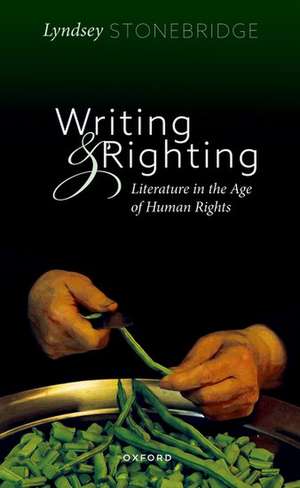Writing and Righting: Literature in the Age of Human Rights
Autor Lyndsey Stonebridgeen Limba Engleză Paperback – dec 2022
| Toate formatele și edițiile | Preț | Express |
|---|---|---|
| Paperback (1) | 115.90 lei 10-16 zile | |
| OUP OXFORD – dec 2022 | 115.90 lei 10-16 zile | |
| Hardback (1) | 162.48 lei 10-16 zile | +26.86 lei 4-10 zile |
| OUP OXFORD – 26 noi 2020 | 162.48 lei 10-16 zile | +26.86 lei 4-10 zile |
Preț: 115.90 lei
Preț vechi: 126.65 lei
-8% Nou
Puncte Express: 174
Preț estimativ în valută:
22.18€ • 23.07$ • 18.31£
22.18€ • 23.07$ • 18.31£
Carte disponibilă
Livrare economică 14-20 martie
Preluare comenzi: 021 569.72.76
Specificații
ISBN-13: 9780192884688
ISBN-10: 0192884689
Pagini: 176
Dimensiuni: 136 x 214 x 10 mm
Greutate: 0.23 kg
Editura: OUP OXFORD
Colecția OUP Oxford
Locul publicării:Oxford, United Kingdom
ISBN-10: 0192884689
Pagini: 176
Dimensiuni: 136 x 214 x 10 mm
Greutate: 0.23 kg
Editura: OUP OXFORD
Colecția OUP Oxford
Locul publicării:Oxford, United Kingdom
Recenzii
Over the past 20 years, Lyndsey Stonebridge has emerged as one of our most interesting literary critics. She brings together modern writers and their experience of some of the darkest episodes of the 20th century: exile, war crimes trials, humanitarian disasters... The book often has the strengths of Stonebridge's earlier works. She moves between detailed literary criticism and large questions about human rights and contemporary society. Perhaps most important of all is the originality of her subject, expanding the remit of literary criticism... Stonebridge is at her best offering fascinating close readings that open onto big, important subjects.
Stonebridge is an immensely gifted writer and thinker. Her new book will help to revitalise literary criticism.
Pithy and powerful, this book plumbs the crucial questions of our times. If its focus is on what literature can be and do, its preoccupation is with the ethics and politics of writing in a world where liberal individualism and the pursuit of rights has tipped us into a malign logic of totalitarianism. Stripped of citizenship, millions are stripped of the right to be heard. Yet words can make injustice visible, sometimes in their intensity, even take on performative power. Stonebridge's literary ammunition comes from both history and the present, from Virginia Woolf to Kamila Shamsie, from Freud and Sartre to writers like Yousif Qasmiyeh in a refugee camp, while Hannah Arendt's philosophical force underpins her arguments. This is a passionate book, quick to read, but with a slow burn.
Magnificent- a journey across our times, told with eloquence and depth, ideas and observations abound, opening vistas aplenty
This slim but comprehensively researched, rigorously argued volume tackles human rights, literature, moralities, philosophy, aesthetics as well as our discourses about these in a complex, nuanced and yet completely accessible way. It makes for a challenging, thought-provoking, illuminating, and at times discomfiting read. This volume -to borrow from Stonebridge herself -is a must read for lawyers and philosophers, ideologues and academics, to thinkers, writers, teachers, readers, artists, activists, survivors and indeed each one of us who has ever lost themselves to a story that may be our own or entirely of another.
Stonebridge is an immensely gifted writer and thinker. Her new book will help to revitalise literary criticism.
Pithy and powerful, this book plumbs the crucial questions of our times. If its focus is on what literature can be and do, its preoccupation is with the ethics and politics of writing in a world where liberal individualism and the pursuit of rights has tipped us into a malign logic of totalitarianism. Stripped of citizenship, millions are stripped of the right to be heard. Yet words can make injustice visible, sometimes in their intensity, even take on performative power. Stonebridge's literary ammunition comes from both history and the present, from Virginia Woolf to Kamila Shamsie, from Freud and Sartre to writers like Yousif Qasmiyeh in a refugee camp, while Hannah Arendt's philosophical force underpins her arguments. This is a passionate book, quick to read, but with a slow burn.
Magnificent- a journey across our times, told with eloquence and depth, ideas and observations abound, opening vistas aplenty
This slim but comprehensively researched, rigorously argued volume tackles human rights, literature, moralities, philosophy, aesthetics as well as our discourses about these in a complex, nuanced and yet completely accessible way. It makes for a challenging, thought-provoking, illuminating, and at times discomfiting read. This volume -to borrow from Stonebridge herself -is a must read for lawyers and philosophers, ideologues and academics, to thinkers, writers, teachers, readers, artists, activists, survivors and indeed each one of us who has ever lost themselves to a story that may be our own or entirely of another.
Notă biografică
Lyndsey Stonebridge is Professor of Humanities and Human Rights at University of Birmingham. Her books include: The Judicial Imagination: Writing after Nuremberg (2011/2014), winner of the British Academy Rose Mary Crawshay Prize, The Destructive Element (1998), Reading Melanie Klein (with John Phillips, 1998), The Writing of Anxiety (2007), and British Fiction after Modernism (with Marina MacKay, 2007). She is currently collaborating on a large interdisciplinary project, Refugee Hosts.
